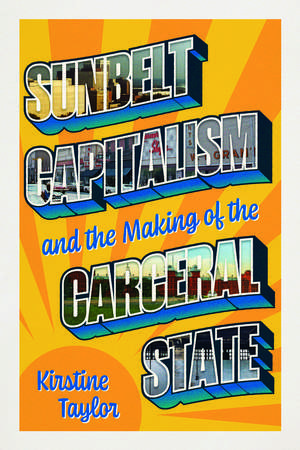Sunbelt Capitalism and the Making of the Carceral State: Chicago Series in Law and Society
Autor Kirstine Tayloren Limba Engleză Paperback – 17 mar 2025
Sunbelt Capitalism and the Making of the Carceral State examines the evolution of southern criminal punishment from Jim Crow to the dawn of mass incarceration, charting this definitive era of carceral transformation and expansion in the southern United States. The demise of the county chain gang, the professionalization of police, and the construction of large-scale prisons were among the sweeping changes that forever altered the southern landscape and bolstered the region’s capacity to punish. What prompted this southern revolution in criminal punishment?
Kirstine Taylor argues that the crisis in the cotton fields and the arrival of Sunbelt capitalism in the south’s rising metropolises prompted lawmakers to build expansive, modern criminal punishment systems in response to Brown v. Board of Education and the Black freedom movements of the 1960s and ‘70s. Taking us inside industry-hunting expeditions, school desegregation battles, the sit-in movement, prisoners’ labor unions, and policy commissions, Taylor tells the story of how a modernizing south became the most incarcerated region in the globe’s most incarcerated nation.
Din seria Chicago Series in Law and Society
-
 Preț: 201.21 lei
Preț: 201.21 lei -
 Preț: 200.82 lei
Preț: 200.82 lei -
 Preț: 184.45 lei
Preț: 184.45 lei -
 Preț: 115.90 lei
Preț: 115.90 lei -
 Preț: 217.57 lei
Preț: 217.57 lei -
 Preț: 216.42 lei
Preț: 216.42 lei -
 Preț: 120.37 lei
Preț: 120.37 lei -
 Preț: 208.20 lei
Preț: 208.20 lei -
 Preț: 225.53 lei
Preț: 225.53 lei -
 Preț: 262.11 lei
Preț: 262.11 lei -
 Preț: 290.55 lei
Preț: 290.55 lei -
 Preț: 241.26 lei
Preț: 241.26 lei -
 Preț: 263.43 lei
Preț: 263.43 lei -
 Preț: 293.60 lei
Preț: 293.60 lei -
 Preț: 388.96 lei
Preț: 388.96 lei -
 Preț: 264.38 lei
Preț: 264.38 lei -
 Preț: 261.59 lei
Preț: 261.59 lei -
 Preț: 259.51 lei
Preț: 259.51 lei -
 Preț: 236.78 lei
Preț: 236.78 lei -
 Preț: 244.16 lei
Preț: 244.16 lei -
 Preț: 235.79 lei
Preț: 235.79 lei -
 Preț: 235.79 lei
Preț: 235.79 lei - 23%
 Preț: 574.44 lei
Preț: 574.44 lei -
 Preț: 294.37 lei
Preț: 294.37 lei -
 Preț: 290.34 lei
Preț: 290.34 lei -
 Preț: 321.66 lei
Preț: 321.66 lei -
 Preț: 276.31 lei
Preț: 276.31 lei -
 Preț: 218.36 lei
Preț: 218.36 lei -
 Preț: 267.82 lei
Preț: 267.82 lei -
 Preț: 266.29 lei
Preț: 266.29 lei -
 Preț: 285.62 lei
Preț: 285.62 lei -
 Preț: 259.89 lei
Preț: 259.89 lei -
 Preț: 320.80 lei
Preț: 320.80 lei -
 Preț: 365.84 lei
Preț: 365.84 lei - 13%
 Preț: 206.04 lei
Preț: 206.04 lei - 21%
 Preț: 549.91 lei
Preț: 549.91 lei
Preț: 199.82 lei
Nou
Puncte Express: 300
Preț estimativ în valută:
38.24€ • 39.50$ • 31.83£
38.24€ • 39.50$ • 31.83£
Carte nepublicată încă
Doresc să fiu notificat când acest titlu va fi disponibil:
Se trimite...
Preluare comenzi: 021 569.72.76
Specificații
ISBN-13: 9780226838427
ISBN-10: 0226838420
Pagini: 256
Ilustrații: 6 halftones, 2 line drawings, 3 tables
Dimensiuni: 152 x 229 x 18 mm
Greutate: 0.37 kg
Ediția:First Edition
Editura: University of Chicago Press
Colecția University of Chicago Press
Seria Chicago Series in Law and Society
ISBN-10: 0226838420
Pagini: 256
Ilustrații: 6 halftones, 2 line drawings, 3 tables
Dimensiuni: 152 x 229 x 18 mm
Greutate: 0.37 kg
Ediția:First Edition
Editura: University of Chicago Press
Colecția University of Chicago Press
Seria Chicago Series in Law and Society
Notă biografică
Kirstine Taylor is associate professor of political science at Ohio University, where she is also a faculty member in the Center for Law, Justice, and Culture. Her research has appeared in American Quarterly, Law & Society Review, Theory & Event, and Politics, Groups & Identities.
Cuprins
List of Illustrations
List of Abbreviations
Chapter 1. Introduction: The Sunbelt Carceral State
Chapter 2. The Birth of Law-and-Order Politics
Chapter 3. Black Freedom Struggles, White Violence, and New Criminal Codes
Chapter 4. The Development of Law Enforcement Power
Chapter 5. Captive Labor, Prisoners’ Rights, and the Postwar Prison Boom
Chapter 6. Conclusion: Contesting the Carceral Present
Acknowledgments
Appendix
Notes
Index
List of Abbreviations
Chapter 1. Introduction: The Sunbelt Carceral State
Chapter 2. The Birth of Law-and-Order Politics
Chapter 3. Black Freedom Struggles, White Violence, and New Criminal Codes
Chapter 4. The Development of Law Enforcement Power
Chapter 5. Captive Labor, Prisoners’ Rights, and the Postwar Prison Boom
Chapter 6. Conclusion: Contesting the Carceral Present
Acknowledgments
Appendix
Notes
Index
Recenzii
“Sunbelt Capitalism is a revelation. It is a masterful and compelling account of the interplay of racial, economic, and political factors that rendered the US South a pioneer of mass incarceration as liberal modernizers sought to shed the region's Jim Crow past by embarking on a brutal and unprecedented prison boom.”
“In this brilliant, carefully crafted book, Taylor traces the roots of our contemporary mass incarceration regime to an unlikely source: the emergence of capitalist development in the Sunbelt during the height of the Cold War. Taylor reveals how a cast of political actors and forces shaped the development of the racialized carceral state, from pro-growth boosters to ‘color-blind’ moderates. An indispensable analysis for understanding and contesting the modern prison state.”
“Taylor has masterfully captured the history of crisis and change that ended Jim Crow and birthed a new regime of racialized violence. Motivated to create hospitable investment conditions in this transitional moment, southern politicians declared a new model of law and order and remade their states through expanded criminalization, police professionalization, and new prisons. Sunbelt Capitalism is a crucial contribution to the history of the southern carceral state and an urgent admonition about the expansive and legitimating potential of reform.”
